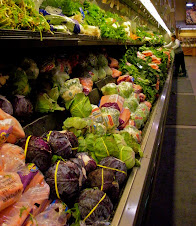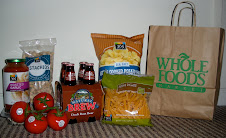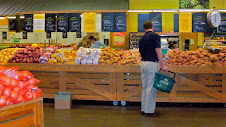By Lindsay Hagerman
Amid the rush to generate an abundance of crops to keep up with increasing demand, farmers have turned to using a lethal cocktail of pesticides to control encroaching disease and insect infestations.
Having shopped at an organic food market for over four years, Kesley Posey, a Marietta resident, has come to know many farmers in the Atlanta area and trusts they do not use prohibited pesticides, herbicides or chemicals on their produce.
“I have been enjoying organic foods since 2006, but before then, I was raised on some organic foods as a kid growing up,” said Posey. “I reverted back to eating organically because I wanted to be healthier and know exactly what I was putting into my body.”
According to Organic.org, a website devoted to educating readers of organic foods, there has been little research that presents solid claims of organic food being more nutritious than conventional food. The variables that affect the outcome of foods, organic or conventional, are extremely temperate and difficult to control. Such variables include seeds, soil conditions, weather, environment and the variety of crops handled in the area.
“You need to be sensible when you are buying foods because not everything organic is really that much different from conventional foods,” said a farmer who asked to be identified as John Smith.
Smith, producer of fresh fruits and vegetables, said that organic food contains about 50 percent more nutrients, minerals and vitamins than conventional produce. Smith also said in order to get the best benefits from organic foods, you need to “assess what part of the product is being ingested, such as an apple’s skin, and whether it’s possible that you will also be consuming chemicals as a result."
“By all means, enjoy organic food. Just be conscious of not becoming a victim of paying more money for organic foods that are basically the same as conventional foods,” said Smith.
Atlanta is home to many organic markets, ranging from freshly cut flowers, to fruits and vegetables, as well as free-range meat. One of the most successful markets in the area is the Morningside Farmers' Market located on the north side of Atlanta.
“We offer all types of organic produce and prepared foods. We are the only certified organic market in Atlanta,” said Jessica Given, the market’s manager.
Given revealed that all farmers at the market have to be certified organic in order to sell their products there, but many farmers cannot afford to go organic. Many would like to be certified, since there is currently such a high demand for fresh produce.
Although this appeal exists, the use of more conventional fertilization techniques, like using pesticides, on organic produce may increase the growing time requirements, making the products more expensive to produce. Extra growing time equates to lower profits for the producers.
“Organic fruits are very desired, as are organic veggies, but since fruit is harder to come by, and takes longer to get established, veggies are more available so folks often ask for fruit specifically,” said Paige Witherington, owner of Serenbe Farms.
Being a consumer of organic foods, Kesley Posey, a Marietta resident, said she has taken an interest in growing tomatoes, herbs, peppers and strawberries to help cope with the sinking economy and resulting increased cost of organic foods.
“The state of the economy has not affected the organic farming industry as much as first predicted,” said Given. “The farmers at Morningside are all very committed to their organic produce and would not consider contaminating their fields with pesticides in order to satisfy the masses.”
“All of our farmers are big proponents of organic produce, but we are aware that not everyone can afford to eat completely organic,” said Given.
Publix grocery stores offer a variety of foods, where the prices are noticeably higher for organic produce. Conventional fruit like Granny Smith apples are $1.99 a pound, whereas organic Granny Smith apples are $2.99. Conventional broccoli is $1.99 a head and organic is $5.29. Strawberries though, whether conventional or organic, are $4.99 a quart.
Health and environmental issues are two of the major concerns that many customers have regarding the use of pesticides and fungicides on produce. Since organic farming does not use harmful chemicals, there is minimal soil, air and water pollution, thus guaranteeing a safer environment in the future.
“My top reason for eating organically is that by law, organic foods must be raised without the use of pesticides,” said Posey. “This means that for myself, I’m not ingesting carcinogenic poisons or genetically altered foods. Also I’m supporting farmers in their endeavors to raise produce in a safe and pesticide free workplace.”
Many market owners encourage their customers to get to know the farmers and learn about the growing practices they use on their crops.
“The health of our bodies is directly related to the food and the health of the food is directly related to the health of the soil, so balanced soils are essential,” said Serenbe Farm owner, Paige Witherington. “Farmers can inform customers about the nutrition of what they're providing.”
An online community called the Organic Consumers Association (OCA) is a public interest organization campaigning for health, justice, and sustainability concerning organic foods. Associations like the OCA are an essential resource for consumers who want to learn more about the lifestyle they are supporting. The sustainability of the association gives consumers a firm base for their beliefs in organics, as well as helping others convert to eating organically.
“On the green side of things, it is much safer for our environment and our fellow species if we do not use toxic chemicals on farms and instead choose to eat organically,” said Posey.
When shopping at a supermarket, choices are made about almost everything that is put in the shopping cart. Taking these choices a step further by examining whether the product is fresh, or is a healthy choice is very important to ensure a healthy lifestyle.
Choosing to eat organically stems from personal choice. The resulting effects of the decision all depend on whether one chooses organic or conventional. Making the choice to go organic helps to ensure that everyone is doing his or her part to help the earth to stay green.


